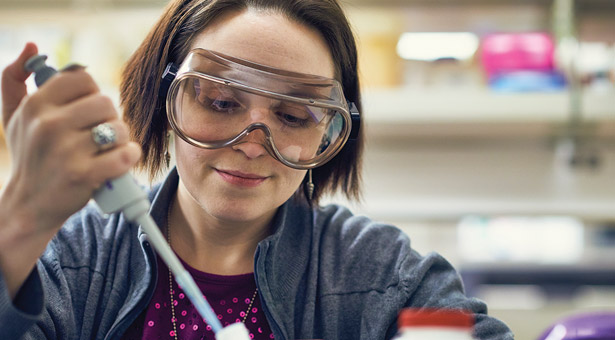Science & Technology Research and Discoveries
Student Sharpens Research Skills Through Microbial Research Internship
From the Navy to the Lab
By Roberta Kwok | Photo by Garland Cary
 Meaghan Menth
Meaghan Menth
Before this summer’s internship, Meaghan Menth had no lab research experience outside her science classes (where for one of her projects she designed beet-based ketchup).
But she’s never been the type to shy away from new challenges.
Menth, a senior dietetics major, joined the U.S. Navy immediately after high school and served as a welder and inspector for more than 13 years, posted at stations ranging from Guam to Italy. After she was diagnosed with psoriatic arthritis, a chronic condition that causes joint pain, a Veterans Affairs rehabilitation program helped her choose a new career she could pursue with her disability: dietetics.
In late 2014, she noticed a summer research program run by the National Institutes of Health, for students from underrepresented groups. Menth already knew she wanted to pursue the scientific research side of dietetics. And her profile fit the bill: She comes from a low-income background and is the first member of her family to attend college.
“I can qualify for that,” she remembers thinking. “It’s perfect for me.”
Menth applied for the internship, called Short-Term Research Experience for Underrepresented Persons, and was accepted in March. Dietetics research positions were not available, but she secured a spot in a bioengineering lab at the University of Washington.
To investigate this phenomenon, Menth used equipment called magnetic tweezers. First, she set up small chambers of fluid with the “sticky” FimH molecules stuck to one side. Then she injected tiny magnetic beads covered with sugars into the chambers. By turning nearby magnets on and off, she could pull the sugar-coated beads toward and away from the FimH molecules.
Menth used a microscope and high-resolution camera to observe how long the bonds held. “I was able to immediately relate it to some of my military background,” she says — in the Navy, Menth worked with magnets during welding inspections.
She found that some bonds lasted against magnetic force for more than half an hour. The results suggest that the bacteria have evolved special strategies to resist the force of bodily fluids that might otherwise detach them, says bioengineer Wendy Thomas, the lab’s principal investigator.
By better understanding the nature of these bonds, researchers might be able to design treatments to loosen the bacteria’s grip.
Near the end of her nine-week internship, Menth traveled to Bethesda, Maryland and presented her results. She also heard scientists from underrepresented backgrounds talk about challenges they overcame. “It showed you that anybody can do it,” she says. Through the program, she met other interns passionate about science and representatives from organizations like the U.S. Food and Drug Administration.
Menth will graduate in December. She plans to apply for master’s programs with internships in dietetics and hopes her experiences will pave the way for a research position, such as performing nutrition studies at a food manufacturing company.
Even though her research experience was not about dietetics, it will make Menth an excellent candidate for such programs, says Gaile Moe, SPU’s director of general education and Menth’s academic advisor.
“She got this really thorough grounding in how to do research,” says the professor of food and nutritional sciences. “I think this will definitely ratchet her up to the top.”
